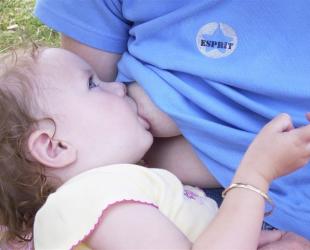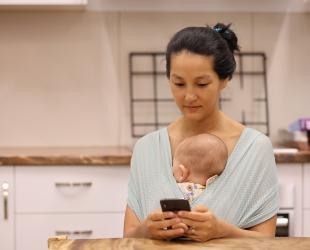Joey's story of breastfeeding with autism
Jessica and Madina chat with Joey, who shares her experience of breastfeeding with autism.

Podcast episode
Podcast information
Joey's story of breastfeeding with autism
Jessica and Madina chat with Joey, who shares her experience of breastfeeding with autism.
Links to resources and information discussed in this episode:
- How to get help and support with breastfeeding.
- LiveChat information, including operating times.
- Information on attachment.
- Amaze, for information on autism. amaze.org.au
Credits: This episode is presented by Jessica Leonard and Madina Hajher. Featuring Joey. Audio editing by Jessica Leonard. Show notes by Belinda Chambers. Transcription by Eleanor Kippen. Produced by Belinda Chambers, Jessica Leonard and Eleanor Kippen.
JOEY: You sort of feel like a failure in a way, because why is everybody else coping with this, and you can't, like why does everybody else want to hold the baby for the whole day and I'm just like eugh.
JESSICA: Welcome to breastfeeding with ABA. A podcast brought to you by volunteers from the Australian Breastfeeding Association. Breastfeeding with ABA is a podcast about breastfeeding made by parents for parents. My name is Jessica and I'm a breastfeeding counsellor with the Australian Breastfeeding Association.
MADINA: And I'm Madina and I'm a volunteer trainee with the Australian Breastfeeding Association.
JESSICA: This podcast records in different parts of Australia. We acknowledge the Traditional Custodians of the lands we're recording on, and the lands you're listening on. We pay our respects to elders past, present and emerging and to any indigenous people listening. We also acknowledge the long history of oral storytelling on this country and of women supporting each other to learn to feed their babies. This episode was recorded on the lands of the Wurundjeri people of the Kulin nation.
MADINA: Today we're speaking to Joey, who's going to share her story of her experience as an autistic woman breastfeeding. Joey, could you please tell us a little bit about yourself and your family? How many children do you have?
JOEY: I've got three kids, (a) bunch of animals and a husband.
MADINA: Great, sounds good! And with your children, have you breastfed all three of them.
JOEY: I did.
MADINA: Yeah, and how long did you breastfeed them for?
JOEY: My first I reached a yea, and a bit. My second one was just under a year or about a year and my third one was around the same.
MADINA: Do you remember what sort of influenced you to want to breastfeed? Is it something you always wanted to do.
JOEY: So, it's something that I always wanted to do. So I jumped straight into it. It wasn't what I expected it to be, but, but definitely something I struggled to continue doing even when it got hard.
MADINA: So, when you say it wasn't what you expected it, was that because of sensory issues with your autism or other reasons?
JOEY: Yeah, so if you're on the spectrum there are like two sensory ways of being. Some people are sensory seeking so they really want touch, affection, pressure. So, like people who are into the weighted blankets and things like that. And then there is sensory avoidant. So, for me, I don't like hugs, I don't like being touched excessively. I don't like people being near me for too long. I can't even layer my clothes. It'll be bucketing down rain, and I won't wear a jacket, because I get claustrophobic.
So, you can imagine being that level of sensory avoidant and then having a baby that wants to breastfeed on demand, and also sleep on you, all hours. It was a huge sort of, adaptive battle.
Surprisingly breastfeeding, although it was really difficult, was not where my sensory aversions were at their worst. So, it was bearable, but not completely enjoyable, that's for sure. Not the bonding experience that's often advertised, but I could see the benefits in it, so I wasn't going to give it up. What I did with my kids when it came to sort of working through the sensory overload was, I would kind of distract myself. So often while they were breastfeeding, I would maybe watch something, do something, read something, try to keep my mind busy so that it wasn't focused on what was happening in that moment. I'm a huge Doctor Who fanatic and at that time it was like one of my biggest obsessions and hyperfixations. And so, I would often just watch Doctor Who while I was breastfeeding, I'll do my uni work or whatever it was that could keep my mind occupied and I find if my mind isn't focused in on what is happening at that moment, it sort of keeps the sensory overload at bay. There's only so much you can do, a lot of it is to just bear it, because of the benefits that it has for the child.
MADINA: During these experiences with your kids, did you know at those times that you were autistic? When did you find out?
JOEY: I found out when my son was a year and a bit. So, he presented with a range of issues. He's got speech delay and all sorts of other things, and I was like, OK, I think he's on the spectrum. I have started researching, and then I sort of was searching for him and on my search for him I discovered how much I related to the criteria, which led me on like the whole spiralling journey, and I ended up finding out what I was. It started when he was a year and a bit. I think he was two and a bit when I actually got diagnosed myself.
MADINA: So was that sort of like a light bulb moment for you when you got diagnosed with regards to, oh, this is why breastfeeding was so challenging for me.
JOEY: Yeah, because you sort of feel like a failure in a way, because why is everybody else coping with this, and you can't like, why does everybody else want to hold the baby for the whole day and I'm just like eugh. Or like you know they, they’re just happy they, they put the baby on the boob and they're just fine, you know? And I'm just like you know, when are you gonna be done. So, there was like a huge guilt I had particularly with the first one. Which is why I think I kept on trying so hard to continue. And then again with the second one, I had a lot of guilt because he had ... so his speech delay is connected to muscle problems in his mouth. So, from the minute he was born, he was a very difficult feeder. He feeds with a great intensity like ... I don’t know how to explain it. It's like I'll put a vacuum to my boob.
MADINA: Ohh, wow yeah. [laughter]
JOEY: That's why with him I ended up having to sort of seek a bit more support, because it was like a whole other ball game. I felt guilty a lot, because I was like, you know, what do I do, and how do I support them, why do I feel this way? And then when I found out that I was on the spectrum and there was like all of these rational reasons for why I was experiencing such, like, intense sensory reactions to them I was like, oh, OK, at least it's a thing, it's not just me, there are other people out there that have this issue.
JESSICA: According to Amaze, an organization that advocates and educates on everything related to autism, Joey's experience of diagnosis is pretty common. They say that many autistic women are not diagnosed until their children are diagnosed with autism. Without a diagnosis and the appropriate support, autistic mothers can experience stigma, social isolation, anxiety and depression. Joey got a lot of support through different breastfeeding challenges she faced. A nurse at the hospital told her about ABA.
JOEY: I remember her saying if you have any further issues to contact ABA. And then I didn't call because I'm not, like I don’t, I just don't call. But I did use their website. I did jump online and sought support that way.
JESSICA: ABA now has a live chat service on its website. You can go to breastfeeding.asn.au to find out operating times. It's a service that makes getting help more accessible to people who are neurodiverse who, like Joey, are often uncomfortable speaking on the phone.
MADINA: While despite your challenges that you've faced with your breastfeeding journeys, is there anything that you sort of look back on fondly during those years breastfeeding your children?
JOEY: All of it. I mean, even the difficult stuff. It's a story I could tell them. It's something I lord over them and make them feel guilty for. And it's, it's just something you know, it's a fun story. Like you know, every difficulty you experience in life is a fun story you can tell when you're older. So, I don't regret any of it. I see it in them like how much it has supported their immune systems, how much it’s made a difference to them physically and to me and to our connection with each other. And yeah, even though I'm talking about like sensory nightmares and all of that, like it's not the whole experience. That's, like very specific periods where you know there were difficulties. But overall, like I wouldn't have changed it for anything.
JESSICA: A huge thank you to Joey for sharing her story in this episode. Check out the show notes for links to related information. If you're in a position to support the work ABA does financially, then you can become a member by visiting breastfeeding.asn.au, and that will link you in with your local group as well. If you want to speak to a breastfeeding counsellor call the National Breastfeeding Helpline on 1800 686 268. So that's open 24 hours a day, every day of the year. Our LiveChat service is another option so you can check the website to see when that's open.
Thanks heaps for listening. We'd love it if you can rate review and subscribe to the Breastfeeding … with ABA podcast wherever you're listening.
END.



